Solar Installers Winthrop
Top 10 Solar Companies in Winthrop
Receive 3 FREE Solar Installers quotes for your project today! Compare profiles, reviews, accreditations, portfolio, etc... and choose the best service.

New England Clean Energy
4.353 reviews[Address Line 1], [Address Line 2], [Street Address], [City], [Zip Code], USNew England Clean Energy is a local solar installation company that has been providing solar panel installations and clean energy systems to Massachusetts, New Hampshire, Rhode Island, and Maine for over 15 years. They offer well-designed and expertly planned solar installations for homes and businesses, including a Generac PWRcell whole house solar battery system. Their mission is to increase home value while reducing carbon footprint.
- Services
- Why Us?
- Accreditations
- Our Team
- Testimonials
- Gallery
Get Quote
Agilitas Energy
12 reviewsWakefield, MA, USA, 401 Edgewater Place, Suite 105, 01880, USAgilitas Energy is a leading developer, builder, owner, and operator of energy storage and renewable energy systems. They specialize in energy storage, solar PV, and hydropower, with a focus on accelerating the country's energy transition to a clean, thriving economy. Their team includes experts in development, engineering, procurement, construction management, and asset management, ensuring projects are completed on schedule with technical integrity.
- Services
- Why Us?
- Accreditations
- Our Team
- Testimonials
- Gallery
Get Quote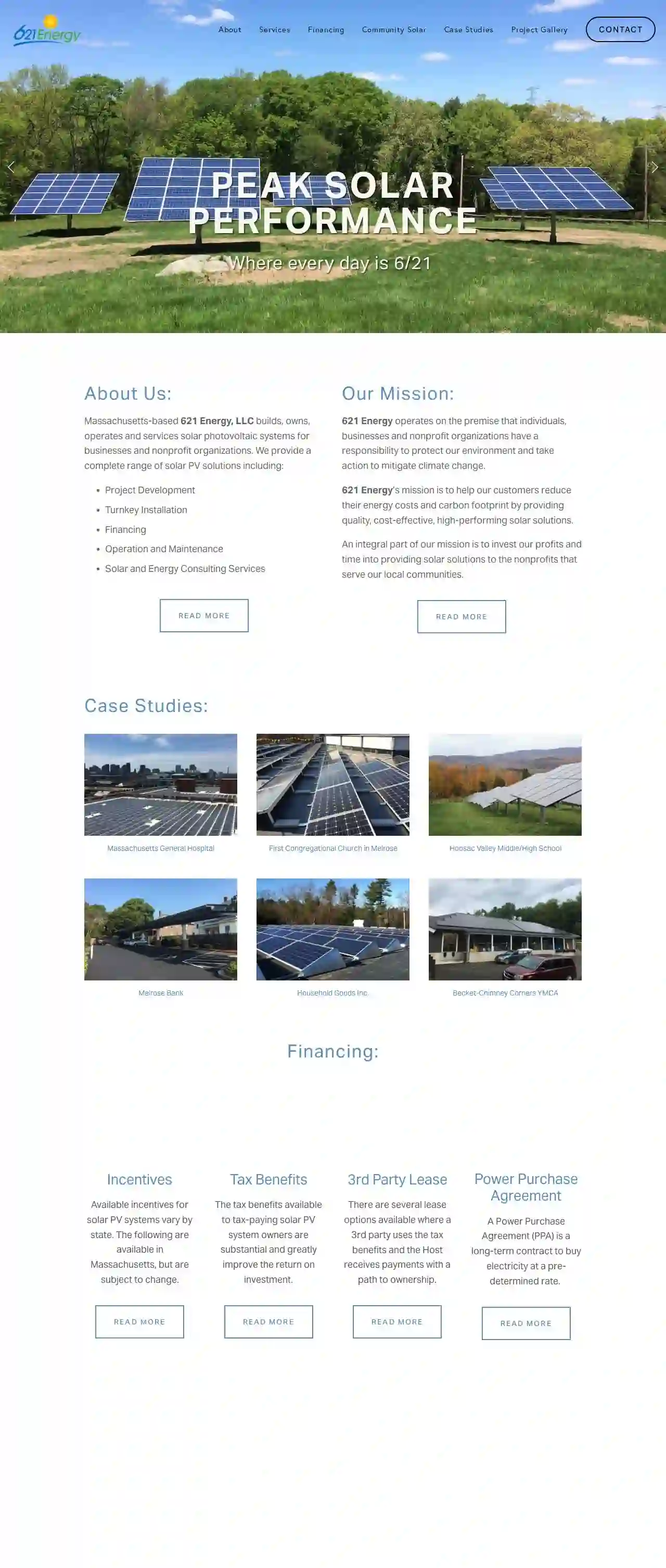
621 Energy
Concord, MA, USA, 152 Commonwealth Avenue, Suite 21, 01742, US621 Energy is a Massachusetts-based company that builds, owns, operates, and services solar photovoltaic systems for businesses and nonprofit organizations. They provide a complete range of solar PV solutions including project development, turnkey installation, financing, operation and maintenance, and solar and energy consulting services. Their mission is to help customers reduce their energy costs and carbon footprint by providing quality, cost-effective, high-performing solar solutions. They also invest profits and time into providing solar solutions to nonprofits that serve local communities.
- Services
- Why Us?
- Accreditations
- Our Team
- Testimonials
- Gallery
Get Quote
Team Sunshine Construction, LLC.
4.752 reviews24 Spice St. Boston, Ma, N/A, Boston, 02129, USTeam Sunshine is a New England-based solar installation company that offers a range of services including solar panel installation, roofing, and heat pumps. They are known for their industry-leading equipment, 25-year warranty, and commitment to providing sustainable energy solutions. The company is headquartered in Hudson, MA, and operates in all six New England states.
- Services
- Why Us?
- Accreditations
- Our Team
- Testimonials
- Gallery
Get Quote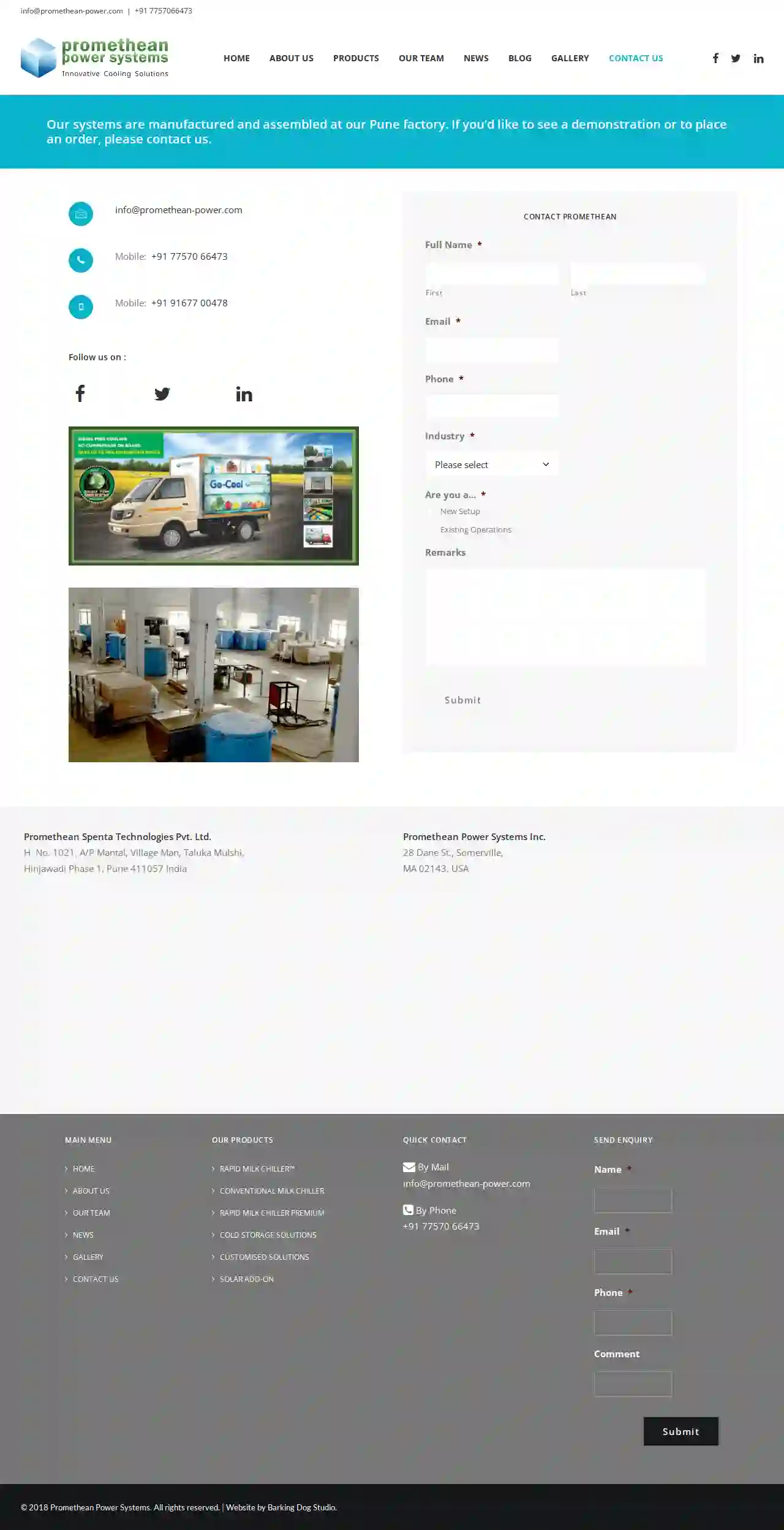
Promethean Power Systems
Hinjawadi Phase 1, Pune, H. No. 1021, A/P Mantal, Village Man, Taluka Mulshi, 411057, USPromethean Power Systems designs and manufactures refrigeration systems for cold-storage and milk chilling applications in off-grid and partially electrified areas of developing countries. Our goal is to empower smallholder farmers through decentralized, sustainable cold storage solutions.
- Services
- Why Us?
- Accreditations
- Our Team
- Testimonials
- Gallery
Get Quote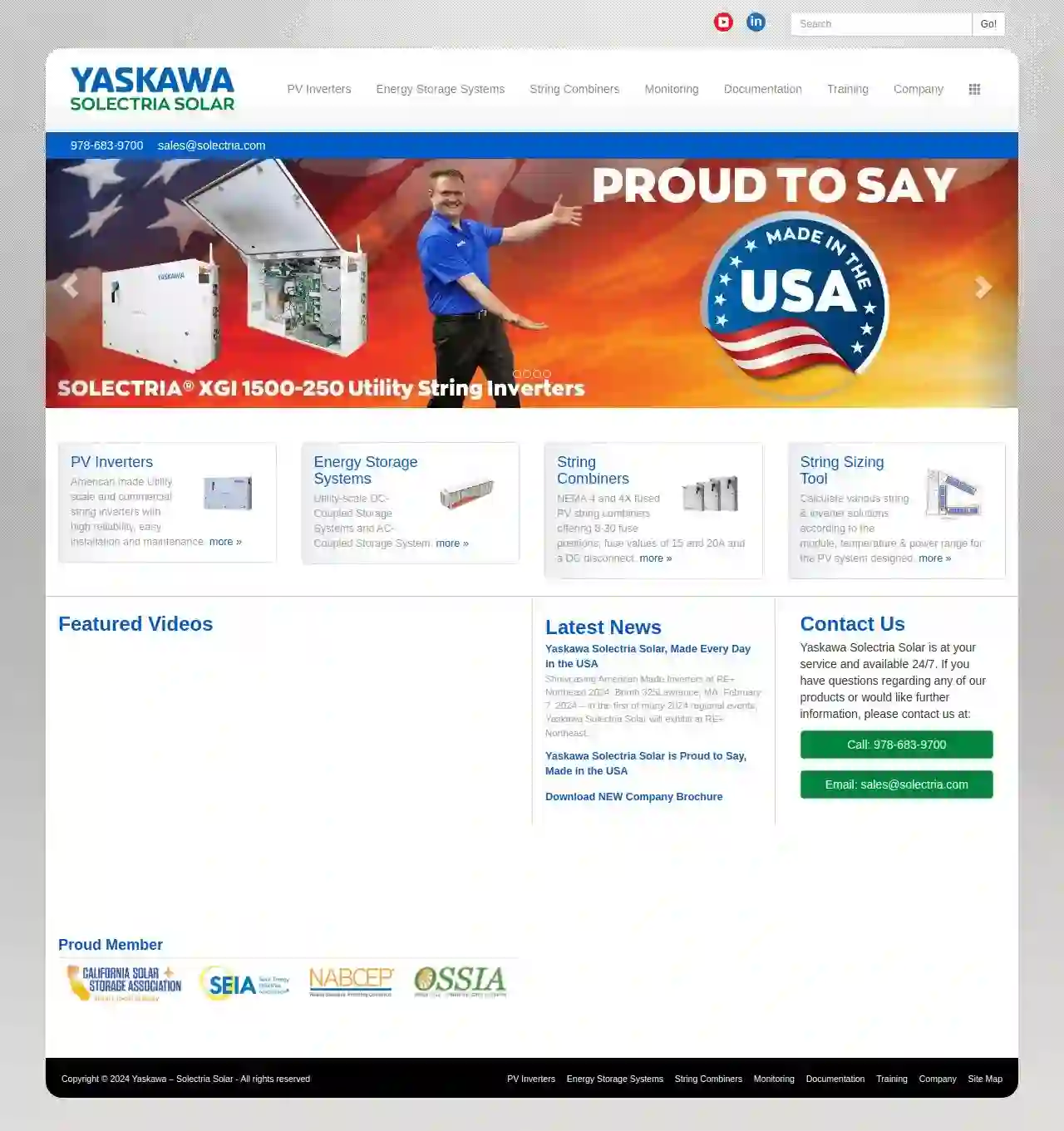
Yaskawa Solectria Solar
2.210 reviewsBuilding 9, Suite 221, Lawrence, MA, 360 Merrimack Street, 01843, USYaskawa Solectria Solar is a leading provider of premium high efficiency and reliable power electronics for renewable power generation. Founded in 2005 by Anita and James Worden, the company has grown into the leading commercial solar inverter manufacturer in the USA. In 2014, Solectria Renewables was acquired by Yaskawa America, Inc. and changed its business name to Yaskawa Solectria Solar. The company's headquarters is located in Lawrence, Massachusetts, and it leverages the strengths and resources of Yaskawa America, Inc. to create the highest quality solar inverter product line.
- Services
- Why Us?
- Accreditations
- Our Team
- Testimonials
- Gallery
Get Quote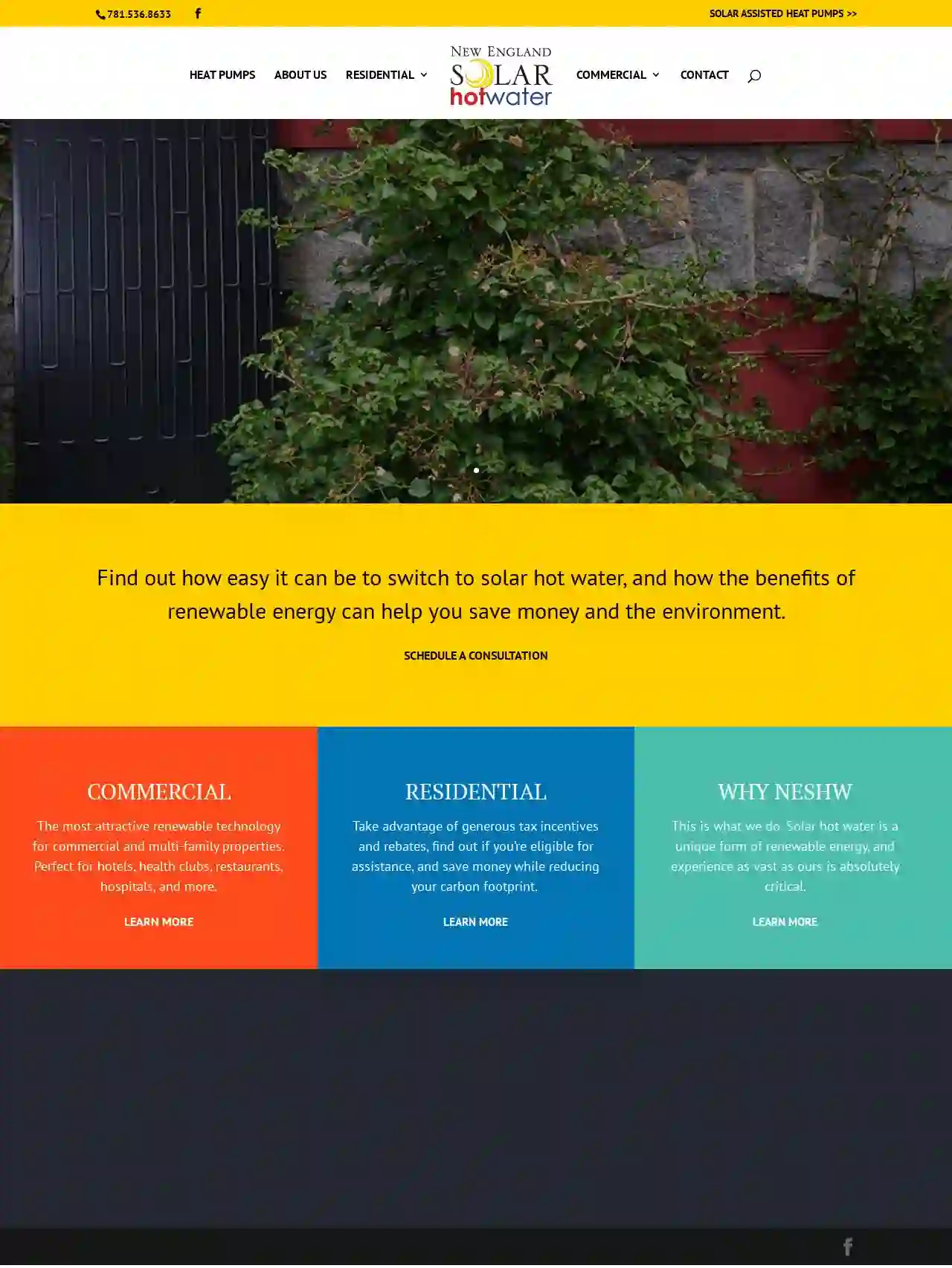
New England Solar Hot Water
4.45 reviewsCanton, MA, USA, 1000 Turnpike Street, 02021, USNew England Solar Hot Water, Inc. specializes in providing residential and commercial solar hot water solutions. They offer a unique form of renewable energy, with a focus on solar hot water systems. Their team has extensive experience in the field, ensuring that customers receive the best service and solutions. They provide information on the benefits of solar hot water, how it works, and testimonials from satisfied customers. Additionally, they offer a complimentary consultation for those interested in learning more about their services.
- Services
- Why Us?
- Accreditations
- Our Team
- Testimonials
- Gallery
Get Quote
Enel North America
4.739 reviewsNew York, NY, USA, 123 Main St, 10001, USEnel North America is a clean energy leader in the U.S. and Canada, working to electrify the economy and build a zero-carbon future. As part of one of the world’s largest renewables players, Enel North America is driving a just, equitable energy transition to 100% clean electricity.
- Services
- Why Us?
- Accreditations
- Our Team
- Testimonials
- Gallery
Get Quote
Solect Energy
36 reviews123 Main St, Suite 100, Framingham, 01701, USSolect Energy is a leading name in the commercial solar industry, specializing in cost reduction and optimizing solar investments. They offer tailored energy solutions, ensuring quality, safety, and efficiency to meet the highest industry standards. Solect is a full-service solar developer, offering solar solutions, energy storage, optimization services, and financing guidance for commercial, public, and nonprofit organizations. They believe in relationships beyond revenue, meaning your best interest drives everything they do.
- Services
- Why Us?
- Accreditations
- Our Team
- Testimonials
- Gallery
Get Quote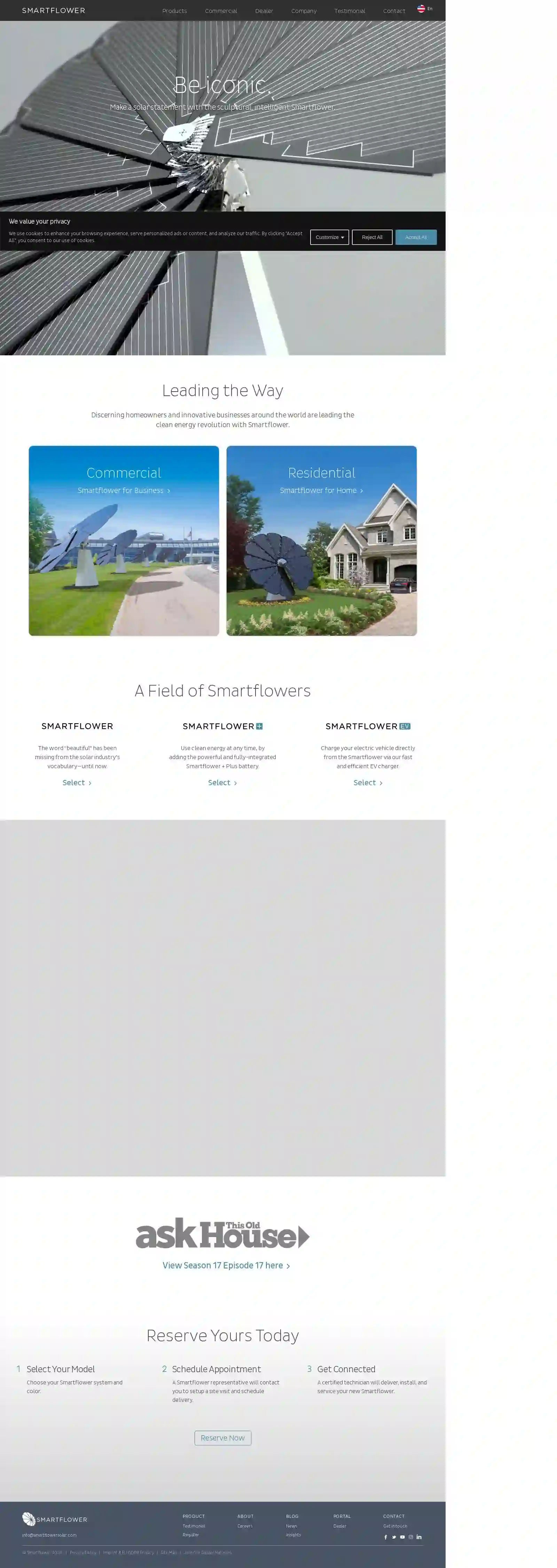
Smartflower Solar
36 reviewsBoston, MA, US Office, 20 Park Plaza, 02116, USSmartflower is a leading innovator in the solar industry, offering a range of solar solutions for both residential and commercial use. Their products are designed to be both functional and aesthetically pleasing, making them a popular choice for those looking to integrate solar energy into their homes or businesses. With a focus on sustainability and renewable energy, Smartflower aims to make the world a greener place through their innovative solar solutions.
- Services
- Why Us?
- Accreditations
- Our Team
- Testimonials
- Gallery
Get Quote
Over 4,210+ Solar Installers on our platform
Our solar companies operate in Winthrop & surroundings!
SolarCompaniesHub has curated and vetted the Best Solar Installers near Winthrop. Find a top & trustworthy pro today.
Frequently Asked Questions About Solar Installers
- Use a Directory Like SolarCompaniesHub: We connect you with pre-screened, qualified solar installers in your area.
- Check Online Reviews: Look for positive reviews on Google, Yelp, and other reputable sources.
- Ask for Referrals: Get recommendations from friends, family, or neighbors who have gone solar.
- Verify Credentials: Ensure the installer is licensed, insured, and certified by reputable organizations (e.g., NABCEP in the US).
- Get Multiple Quotes: Compare quotes from at least 3-4 installers to find the best value for your project.
- Ask Questions: Don't hesitate to ask installers about their experience, warranties, and the process they follow.
- Solar Panel Warranty: From the panel manufacturer, typically covering defects in materials and workmanship for 10-25 years. Some manufacturers offer performance guarantees, ensuring a certain level of energy output over time.
- Solar Installation Warranty: From the solar installer, covering the quality of the installation work for 1-10 years. This warranty protects you from leaks, faulty wiring, or other issues caused by improper installation.
- Adequate Sunlight: Unobstructed sunlight for a significant portion of the day.
- Sufficient Space: Enough space to accommodate the desired number of panels.
- Structural Integrity: A strong roof structure capable of supporting the weight of the panels.
- Appropriate Orientation and Tilt: Ideally, the roof should face south (in the Northern Hemisphere) or north (in the Southern Hemisphere) with a tilt angle close to the latitude of your location. However, other orientations and tilts can still be effective.
How do I find a good solar installer near me?
What kind of warranty should I expect for my solar panel system?
Do I need to replace my roof before installing solar panels?
How do I know if my roof is suitable for solar panels?
How do I find a good solar installer near me?
- Use a Directory Like SolarCompaniesHub: We connect you with pre-screened, qualified solar installers in your area.
- Check Online Reviews: Look for positive reviews on Google, Yelp, and other reputable sources.
- Ask for Referrals: Get recommendations from friends, family, or neighbors who have gone solar.
- Verify Credentials: Ensure the installer is licensed, insured, and certified by reputable organizations (e.g., NABCEP in the US).
- Get Multiple Quotes: Compare quotes from at least 3-4 installers to find the best value for your project.
- Ask Questions: Don't hesitate to ask installers about their experience, warranties, and the process they follow.
What kind of warranty should I expect for my solar panel system?
- Solar Panel Warranty: From the panel manufacturer, typically covering defects in materials and workmanship for 10-25 years. Some manufacturers offer performance guarantees, ensuring a certain level of energy output over time.
- Solar Installation Warranty: From the solar installer, covering the quality of the installation work for 1-10 years. This warranty protects you from leaks, faulty wiring, or other issues caused by improper installation.
Do I need to replace my roof before installing solar panels?
How do I know if my roof is suitable for solar panels?
- Adequate Sunlight: Unobstructed sunlight for a significant portion of the day.
- Sufficient Space: Enough space to accommodate the desired number of panels.
- Structural Integrity: A strong roof structure capable of supporting the weight of the panels.
- Appropriate Orientation and Tilt: Ideally, the roof should face south (in the Northern Hemisphere) or north (in the Southern Hemisphere) with a tilt angle close to the latitude of your location. However, other orientations and tilts can still be effective.